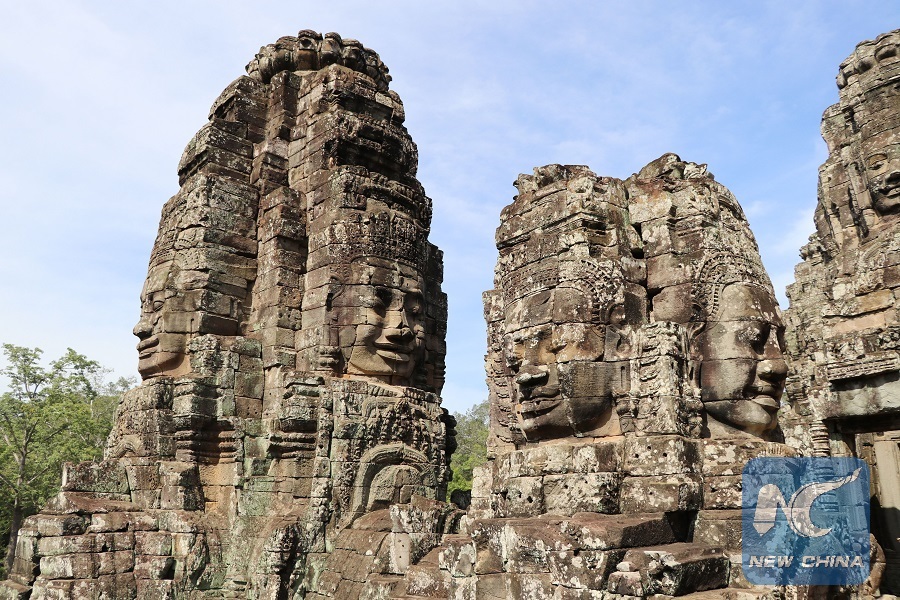
Angkor Wat temple complex is seen in Siem Reap province, Cambodia, June 19, 2017. (Xinhua/Mao Pengfei)
by Mao Pengfei, Nguon Sovan
PHNOM PENH, Dec. 25 (Xinhua) -- The year of 2017 has marked a significant milestone in Cambodia-China tourism relations as China became the biggest source of foreign tourists to Cambodia after it overtook Vietnam in the first quarter of the year, said Cambodian Tourism Minister Thong Khon.
MILESTONE YEAR
The year of 2017 will be the first year that Chinese tourists to the Southeast Asian country have surpassed the 1 million mark, he said.
"It is a milestone year for tourism relations between our two countries," the minister told Xinhua in a recent interview.
He said Cambodia received 4.3 million foreign visitors during the first 10 months of 2017, up 10 percent from the same period last year. Of the number, Chinese tourists accounted for almost 950,000, up 45 percent.
The minister said Chinese tourists represented 21.9 percent of the total international tourists to the kingdom.

Spectator watches stage show Angkor Dynasty at a performing arts theater in Siem Ream Province, Cambodia, Oct. 25, 2017. (Xinhua/Mao Pengfei)
"Based on the figures, it's expected that Chinese tourists to Cambodia will exceed 1 million in 2017," he said, adding that the arrivals of Chinese tourists had brought about 700 million U.S. dollars into the Cambodian economy this year.
SPENDING POWER
Thong Khon said that a tourist spent an average of 700 U.S. dollars during his or her stay in Cambodia, which greatly contributed to developing the local economy and reducing poverty. Their spending in Cambodia can feed many local people, the minister said.
The minister attributed the strong and steady increase of Chinese tourists to Cambodia to the Comprehensive Strategic Partnership of Cooperation that the two countries forged in 2010.
"Following this positive and comprehensive strategic cooperation between the two countries, it has led to an increase in the number of Chinese investors as well as Chinese tourists to Cambodia every year," he said.
The growth was also due to Cambodia's political stability, attractive tourism sites and increasing direct flights between the two countries, Thong Khon said, adding that there were 126 direct flights each week connecting China and Cambodia.
"About 50 percent of Chinese tourists to Cambodia spend their holidays visiting the Angkor archeological Park in Siem Reap province," he said, adding that the rest of them visited coastal areas in Preah Sihanouk province and capital Phnom Penh.
2020 TARGET
Thong Khon said Cambodia is projected to attract 7 million international visitors, including 2 million Chinese tourists in 2020, which could lead to a gross revenue of 5 billion U.S. dollars and create local jobs for 1 million people.
To achieve the 2-million-Chinese tourist target by 2020, Cambodia launched a "China Ready" strategy in early 2016, he said.
The strategy listed steps to be taken by tourism authorities to facilitate visits by Chinese tourists, such as providing Chinese signs and documents for visa processing, encouraging local use of the Chinese currency and the Chinese language, and ensuring that food and accommodation facilities are suited to Chinese tastes.
The strategy also calls for an increase in the number of Chinese-speaking tour guides.
"Based on our clear strategy, we are optimistic that we will be able to achieve the target," he said.
Chhay Sivlin, president of the Cambodia Association of Travel Agents, which represents about 250 tour and travel companies, said close Cambodia-China ties, the richness of Cambodia's cultural heritage sites, and better air route connectivity are the key factors attracting Chinese holiday makers to Cambodia.
She said that Chinese tourists loved shopping, but that some of them were disappointed when they couldn't find enough variety of locally-made products, and when some vendors sold fake products.
"Sometimes, vendors sell products at a very high price, or sell fake products. This is a problem that can affect our tourism business," said Sivlin, who is also president and chief executive officer of CSL Travel & Tours.
"To attract more Chinese tourists, we suggest that the authorities concerned help educate souvenir vendors to sell real products at a reasonable price," she said.
Ho Vandy, president of World Express Tour and Travel Company, which arranges high-class package tours for the more affluent Chinese tourists, said better livelihoods were also a factor encouraging more Chinese to travel overseas on their holidays.
"With their better living conditions, some have been choosing premium tour packages, staying in five-star hotels," he said. "And some have hired helicopters for their journeys in Cambodia."
Tourism is one of the four sectors supporting the Cambodian economy. The country has three world heritage sites, namely Angkor archeological park in northwestern Siem Reap province, Preah Vihear Temple in northwestern Preah Vihear province, and Sambor Prei Kuk archeological site in central Kampong Thom province.
In addition, it has a pristine coastline stretching 450 km and spanning four southwestern provinces of Preah Sihanouk, Kampot, Kep and Koh Kong.

